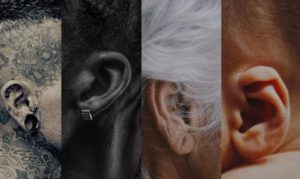 It was the Thursday before Easter. I faced 23 university students clustered around a conference table. We were just past the halfway mark of our course called Writing for the Ear.
It was the Thursday before Easter. I faced 23 university students clustered around a conference table. We were just past the halfway mark of our course called Writing for the Ear.
Today we are going on a soundwalk, I said. No talking, no texting. Remain silent and amble behind me at a comfortable pace. Try to take in the world through sound. Turn down your overworked visual input channels and suspend your impulse to label the sounds you hear. The aim of the soundwalk is to listen to the overlooked, mundane choir of urban life.
For 35 minutes, we snaked around campus and into the nearby neighborhood. We drifted more than walked. And as we did, we immersed ourselves in the soundscape around us, attempting to listen deeply, reverently. At the end we gathered on the grass at the center of campus. I felt saturated and recalibrated. I said goodbye, and we dispersed without discussion.
I teach this class at a small liberal arts university in the Balkans, where there is no history of radio storytelling. While the students here are savvy and skilled, radio stories are not part of their cultures. The stories I am teaching them to make are a mashup of what you hear on The Moth and This American Life—confessional, direct, personal, quirky. I have the students write, tell and create produced stories—some with music, some without, some narrated, some with interviews. They make, and we listen. Hearing, I tell them, is a biological function. Listening is a mental process. It can exhaust, but it can also illuminate.
They have told stories of their lives and the stories of others. They have practiced listening to hours of recorded interviews for moments—the juicy, compelling moments to put into their stories. As one student said, “When you hear it—that one minute of tape out of all the rest—you know that this is what you were looking for. It’s an answer to a question you haven’t asked. A feeling you weren’t expecting to taste.”
I didn’t awaken to sonic storytelling until one morning in 1992 when I turned on NPR and heard the helium-inflected voice of David Sedaris tell me about spending a Christmas season dressed in velvet knickers as a Macy’s elf. The intimacy of his voice. The magnetic nowness. I could feel my imagination tap dancing. I was beguiled by the way all of the world fell away except for the story I was listening to. Text, image, sound: Of all the ways I ingest stories, listening to them has the most radiant and surprising power.
Listening is a process of sifting, of extracting. It asks of me, and I want to be asked. Watching stories can induce a deep marvel and show me astounding sights, but when I watch, my imagination has less to do. I respond, but I don’t participate. Watching stories invites my lethargy.
I am asked when I read stories. With text, the little carpenters in my head jump to and scurry about. They hammer the sets; they sketch and dress the characters. My imagination fires up the tiny cinema in my head. But reading is dominated by the eyes, and the eyes dominate our senses, muscling in as our primary way to process information.
I most savor stories through my ears. My carpenters are busy, the film reel in my head is spooling, and I feel as if I am within something. When I choose to listen, I have chosen to give my attention—my most fickle and precious resource. My eyes are unhooked from a page or a screen. They soften and rest. Instead of moving toward the story, the story comes to me.
Real listening, deep listening encourages me to wade through the emotional aquifer beneath the words I hear. It coaxes my empathy as I give my attention over to the speaker, to the story. French philosopher Simone Weil calls attention the purest form of generosity. I regard listening as the ultimate act of love and validation.
When I came to my office the morning after the soundwalk, one of the students had slid an unsigned note beneath my door. It read: “Thank you for teaching us to listen to the world and to ourselves.”
I may have taught some of them to listen. I’m learning to do it, too. What they have taught me is that conscious listening always creates understanding. We tell. We listen. And we are heard.
Hear more here: https://soundcloud.com/laura-kelly-264925212/in-between-words-personal-vol-1

